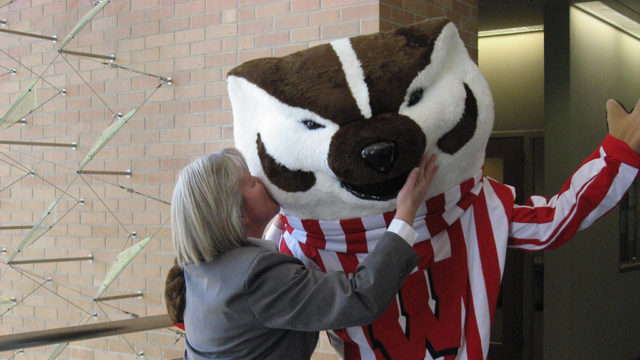
After more than a decade at the School, Roberts will ‘put her shoulder’ to personal, charitable projects
By Katie Gerhards
Jeanette Roberts isn’t an alumna of the University of Wisconsin–Madison School of Pharmacy. But her professional trajectory was nonetheless shaped by a faculty member of the School, just as strongly as she’s impacted thousands of Badger pharmacy graduates.
Roberts—a medicinal chemist, professor, mentor, and philanthropist—is retiring in January 2019 after 15 years at the School of Pharmacy, including 11 as dean and another four as a professor in the Pharmaceutical Sciences Division.
“Under Dean Roberts’ visionary leadership, the School initiated the People and Programs campaign, which raised over $22 million to support our students, faculty and staff; established the Office of Global Health, which helped the School contribute to the Wisconsin Idea; and opened a charitable pharmacy at St. Vincent de Paul, to serve the medication needs of the uninsured in our community here in Madison,” says School of Pharmacy Dean Steve Swanson.
Roberts is also the director for the UW–Madison Center for Interprofessional Practice and Education, which is involved in strengthening and expanding the School’s interprofessional education programming, and she’s on the UW–Madison Athletic Board and is one of the faculty athletics representatives for the NCAA and the Big Ten. Last year, she was named a fellow of the American Association for the Advancement of Science, and she completed a Robert Wood Johnson Foundation Health Policy Fellowship in Washington, DC with Senator Ed Markey.
In short: Roberts has stayed busy, and she has no plans to slow down or disappear simply because she’s retiring.
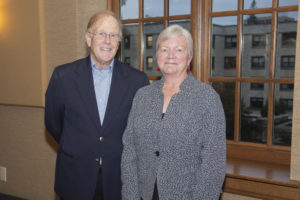
A Pennsylvania native, Roberts followed a passion for medicinal chemistry and using science to improve health to Minnesota, where she had a pivotal interaction with a faculty member—a UW–Madison School of Pharmacy faculty member, Professor Dan Rich, now emeritus.
“Based on my many conversations with Dr. Rich, there was nothing I wanted to do other than become a professor,” she says. “The way he described his daily life, interacting with and mentoring undergraduate and graduate students, being renewed every year teaching new students, and continuing to discover things—it just sounded magical to me. I thought it was perfect.”
But that wasn’t the last time that Rich influenced Roberts’ career plans.
After earning her PhD and completing a postdoctoral fellowship at Los Alamos National Lab, Roberts fulfilled her desire to teach at the University of Utah College of Pharmacy, where she spent 15 years. “I loved every minute of it,” she says. “Teaching pharmacy students and running a laboratory with graduate students and postdocs was an absolute joy. It’s just so exciting to see the students flourish.”
And then Rich called. “He was chairing the search committee for the UW–Madison School of Pharmacy dean position,” Roberts says. “And the rest is history.”
Before her retirement, Roberts shares some of her treasured memories and reflections on her time at the UW–Madison School of Pharmacy, including what pulled her back to the Midwest, in her own words.
Why I became a Badger
When Professor Rich called about the opportunity to be a dean, I wasn’t looking and I promptly forgot about it. But then he called me back and said, “I really want you to apply for this because these opportunities allow you to really explore your values and what’s important to you.” I really appreciated that, and I thought about it.
It came down to the level at which I wanted to make an impact. Being dean is an opportunity to set an agenda and lead a group of faculty, staff, and students boldly into the future—charting the course and developing a shared vision for where we’re going and just making it happen. I relished that chance.
I wouldn’t have gone many places other than here because of the reputation of the School, the campus, and the community. I had visited here once while I was a graduate student at the University of Minnesota, and it was magical. I loved the Southwest, but I’m not sure I’ll ever leave Madison.
My favorite accomplishment
One terrific change I oversaw was expanding our global health opportunities for our students. I just believe that you’re not fully educated unless you get out of Dane County, so it’s been an ongoing process to build and bolster those programs.
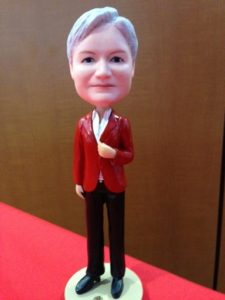
I was often invited to join the site visits, which was always fascinating. Bangkok, for example, has a really active UW–Madison alumni chapter, including a number of pharmacy alums. Hong Kong was quite active as well. Oman was spectacular place to visit. South Africa has turned into a much larger partnership than when it started. All of these locations have a lot to offer student pharmacists.
Another thing I’m very proud of is a dramatic uptick and expansion in alumni relations and fundraising. I love that work, because it’s about relationships. I probably spent 40 percent of my time on that constellation of advancement work over the years and threw parties all over the world to engage alumni and strengthen connections.
Rennebohm Hall had just opened in 2001, two years before my arrival. So instead of having to think about the facility, we could instead design a campaign that was focused on the people inside the building, with the goal of adding $18 million to an endowment for scholarships, professorships, and professional development opportunities. Over the five-year course of the campaign, we raised more than $22 million—and it just snowballed from there. Everybody wants to be involved, and that’s continued. So I love that work and I think it substantially benefited the School, especially in light of recurrent budget cuts at the state level.
My favorite School of Pharmacy moments
Back in the day, in the middle of the worst budget cuts, all state employees were furloughed for eight days a year for two years. So instead of staying home and worrying about the budget, faculty and staff at the School would get together for Furlough Fridays, and we’d bring in a massage chair person, drink champagne and have chocolate-covered strawberries. It was our way of making lemonade out of lemons that were thrown at us.
I was also dean during the 125th anniversary of the School in 2008—we are one of the oldest pharmacy schools in the country. We did many things throughout that year to celebrate, everything from having Babcock Hall create an ice cream flavor for us—Chocolate Apothecherry, which was wonderfully cute—to the marching band acknowledging us at one of the Badger football games by making an enormous “Rx” on the field and playing “A Spoonful of Sugar.” We put together a time capsule earmarked for the 150-year anniversary. It was just one thing after another, through that whole year, and that was spectacular.
How I’ve seen the School change
I have seven C’s of leadership that I talk about a lot and one of them is consistency. I try to be consistent of thought, word and action. I wanted people to know that they could bring me anything and we would work through it no matter how difficult. I think we tackled a lot of challenges that way.
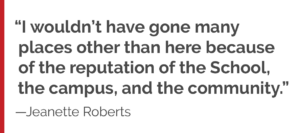
I am a big proponent of social engagement to mix and mingle and further understand each other, but it’s also important to work together. We developed small grants that required faculty from more than one division to work together, a Pharmaceutical Sciences faculty member and a Pharmacy Practice faculty member, for example, to foster impactful collaborations. One of the SoP Research Innovation Awards went to Professor Tim Bugni in the Pharmaceutical Sciences Division and Associate Professor Warren Rose in the Pharmacy Practice Division to study new antibiotics and infectious disease.
What I see in the future
As for the School of Pharmacy, it’s full speed ahead. The quality of our program, the way we’ve maintained the scientific underpinning that any number of schools have just thrown out because it’s labor intensive and high cost. I think that’s really meaningful. The balance we’ve been able to strike between the basic sciences, the clinical sciences and the social sciences is really well done. I’m very optimistic about the future of this School and this campus.
What I’m doing next
Some years ago, several people in the School partnered with the St. Vincent de Paul group here in Madison to open a charitable pharmacy to serve the uninsured population. Originally, St. Vincent’s provided vouchers for medications at a local pharmacy, but when that stopped being a feasible option financially, they decided to bring the dispensing in-house, which meant we needed to find a reputable source of cheap or free medications.
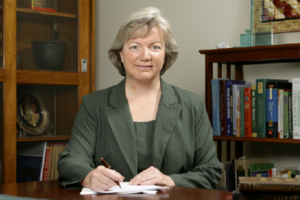
The managing pharmacist, Yolanda Tolson-Eveans (BS ’95), who is also one of our alums and a clinical instructor in the SAS Division, learned about an organization called the Dispensary of Hope out of Nashville, Tenn., which contracts with many generic drug manufacturers and also carriers of some brand named products. They asked me to join their board a few years ago, and I jumped at the opportunity. You can imagine the quality of the people that do this kind of work—it’s extremely rewarding to serve alongside them.
But Dispensary of Hope has very little presence in this part of the country, so I’ve been talking with them for some time about becoming their upper Midwest ambassador after I retire and making their system known to the free clinics and charitable pharmacies around the state and the region to expand their network. I’m going to really put my shoulder to that—on my own schedule.
I also recently became president of the Friends of Wisconsin Public Television board of directors, which is something I deeply believe in, and I’ll be able to devote more time to that. I’m also on the board of Trustees of Albright College, where I completed my undergraduate degree, and that’s been wonderful.
I don’t know in what capacity I’ll remain involved with the School of Pharmacy, but I don’t intend to disappear. Once a Badger, always a Badger.
Learn more about Dr. Roberts’ eminent career.